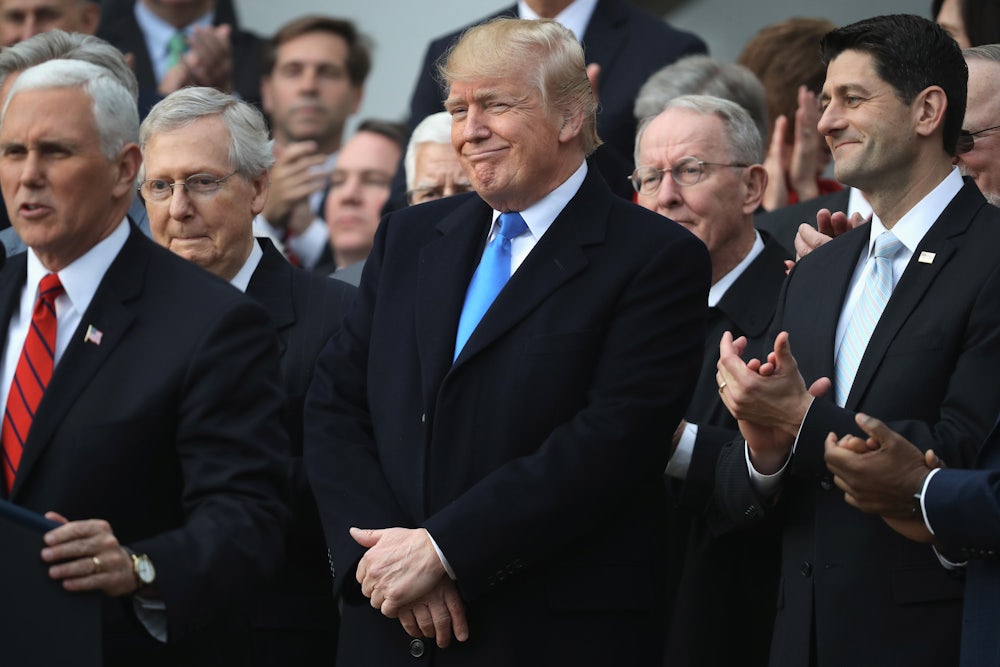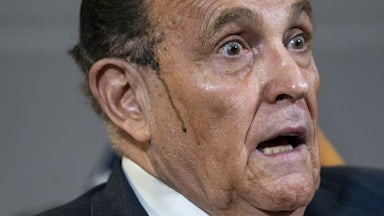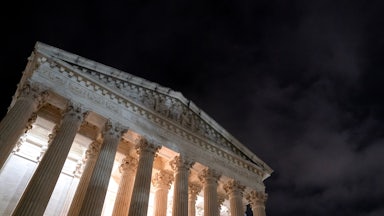If you were to read the headlines—and the headlines alone—about former House Speaker Paul Ryan’s Thursday speech at the Reagan Library, you could only come away with one conclusion: His remarks were a broadside aimed squarely at Donald Trump. The speech “slammed” the former president for the “horrifying” end of his presidency and “urged” the GOP to “shake” its “obsession” with him and instead focus on “principles.”
And yet two words were conspicuously missing from Ryan’s speech, aside from a couple of positive mentions: “Donald Trump.” It was, of course, never really in doubt who the 2012 vice presidential nominee was referring to when he denounced the “yes-men and flatterers flocking to Mar-a-Lago.” But his odd reluctance to name Trump—and his insistence on adopting a kind of smarmy passive aggression—only underscores a larger problem: Even the handful of Republicans who do denounce Trump will only go so far.
Ryan nevertheless went much further than several Republicans who spoke to Politico last week. These Republicans fretted about Trump’s planned return to public events and the effect it would have on their efforts to retake Congress. “If we win the majority back in 17 months, it’s going to be in spite of Trump—not because of Trump,” an anonymous senior House Republican aide told Politico. “He will totally take credit if we win the House back—but it won’t be because of him. This guy is a disaster.”
But reading between the lines—and looking at what Republicans are actually doing across the country while Trump is largely exiled at Mar-a-Lago—it’s clear that what Republicans want isn’t some shake-up of their own party or a break from its Trumpian past. Instead, the GOP is eagerly advancing anti-democratic ideas across the country—the batshit “audit” of the 2020 election taking place in Arizona right now is spreading to New Hampshire and Wisconsin. None of this is substantively different from what the former president desires: It’s the same racist, authoritarian policies, carried out by foot soldiers still in thrall to Trump.
Other quotes in the Politico piece make this explicit. “He’s one of the best presidents we’ve had in terms of policies,” one aide told Politico. “But having said that, if it were up to me, I would never have Trump on any ballot ever again because it’s such a distraction.”
“Multiple Republicans,” the authors write, “say Trump’s appeal can be replicated by someone without the baggage of two impeachments, a Capitol riot he stoked, groundless challenges to his election loss, and a barrage of inflammatory statements. Those GOP lawmakers believe their party is more competitive than it was five years ago but that Trump himself may no longer be the best standard-bearer.”
Even this is a whitewashed account. Many Republicans would certainly be happy with a more disciplined and palatable party standard-bearer. But the GOP has taken Trump’s “groundless challenges to his election loss” and transformed them into a new, key party plank in the first five months of 2021. Across the country, at the state level, Republicans are doing everything they can to make it much harder to vote, using Trump’s absurd lies about the 2020 election as their justification. Voter suppression has long been an important part of Republican politics, but Trump has added a healthy dose of accelerant to an already illiberal flame. Inherent in this is the idea that any Democratic victory is de facto illegitimate.
On Friday, moreover, Senate Republicans—led by Senate Minority Leader Mitch McConnell, the most powerful elected Republican in the country—voted to block a bipartisan commission aimed at looking into the January 6 insurrection at the United States Capitol. If the Republican Party were serious about wanting a change in leadership and direction, backing this commission would be advantageous. Instead, short-term worries about its electoral implications meant only six Republicans in the Senate backed it. Trump, as usual, benefits.
For all of Ryan’s carping on a return to Republican “principles,” the party is less focused on policy than ever, instead endlessly litigating the exact kind of culture-war issues that Trump obsessed over. Republicans still praise Trump every chance they get and fly to Mar-a-Lago for photo ops, even as the president spends much of the day blogging about how the MyPillow guy found discarded voting machines in a dumpster that prove he actually won the election. Ryan, meanwhile, sits in a position of actual power—he is on the board of Fox News—where he’s done nothing to influence the network’s coverage, which remains as Trumpy as it’s ever been.
All of this points to one conclusion. When Republicans say they want Trump to recede into the background, it’s only for the basest political reasons: His very presence engenders a furious countermobilization from Democrats, which must be avoided at all costs if the party wants to win. But the rest of it—the xenophobia, the authoritarianism, the endless culture war, the attacks on voting rights—is here to stay.








